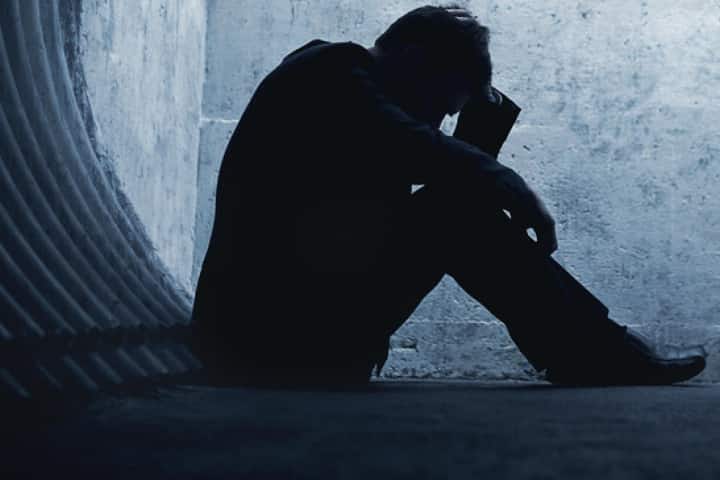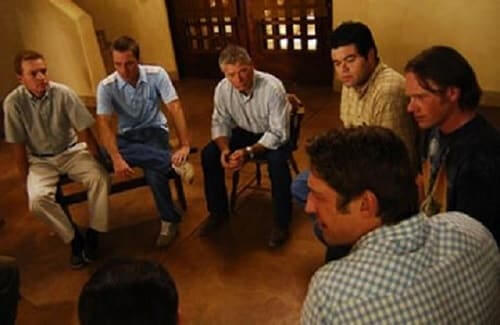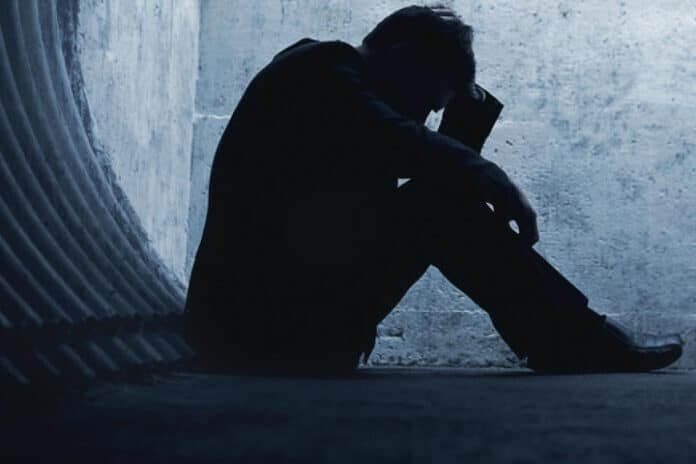With alarmingly high rates of depression among men, it’s important for society to provide avenues and support to express their emotions, writes MOHAN DHALL

I am sitting with a group of men and women. We are talking about various things, including relationships, when I ask a question that leads to silence: “Does anybody here know a man who is depressed or has been depressed?”
A young man eventually speaks up. He says, “Darren* tried to commit suicide”. I knew Darren. He was my son’s friend. They went to university together, but Darren wanted to escape his father.
For over a year he stayed in his room on campus, playing online games and drinking himself to a stupor most nights. His father was not quite the role model he sought, and in finding himself, he lost himself.
—
I am driving with my girlfriend who lives in a country town. She says as we drive, “…and very sadly here is where a young man died. His car hit that tree.” We are silent for a moment. Small towns have a habit of bringing sad news to too many people who internalise their pain.
“I do not think he lost control. He may have driven into the tree on purpose,” I reply. We drive on.
A week later I send her flowers but they do not arrive on time. In the evening, I get a call saying that the delay was on account of the flower deliverer supporting her son. His best friend was the young man who died. It was, she told my girlfriend, a suicide.
—

This is the ‘lucky country’. The land of plenty. The second highest on the Human Development Index as measured by the United Nations.
But this is also where more young men per head of population commit suicide than anywhere else.
I wonder why we have a culture of self-destruction as evidenced in part by binge drinking and I reflect on what men talk about when they are together.
It comes again, inadvertent and unexpected. Like a fog whispering cold, you feel a sense of distance from yourself. Further you fall, behind your eyes, knowing here your only friend is vulnerability. Your voice becomes quieter, the world recedes, everything at this time can hurt you. You feel like you are drowning.
You become engulfed in a wave of darkness and you notice your limbs are heavy and it is hard to walk. When you do walk it takes effort. You walk closer to the buildings, eyes downcast, seeing everything and everyone from the knees down. In this state you seem unreachable. Unknowable. It is sometimes funny to you that in this space people become kinder, more gentle. You know they do not know you and cannot sense the depth of the water pressing down on you. You know they do not know how to reach you, yet somehow they come physically slightly closer.
You wait in this space for when you have been here before you know it will pass – it may be half a day, a few days or longer. You do not know what makes it lift, but like the sun on a foggy morning, the thickness of the darkness lightens. You suddenly realise you can walk more smoothly. It is like you were trying to run in the surf, but only now the water is below your waist do you feel freer. You do not avoid talking and your eyes can see faces. The relief is palpable. The shore is near. You celebrate your rise from darkness with too much enthusiasm – not quite a manic high, but far more energy and humour than you had only a few hours ago.
You look back on the lost days. Wonder where you went. Wonder when the darkness will press down on you again, slowing your breathing and dulling your senses. Wonder why, and also wondering where it is you go, and whether you can be in a place where your inner self is not…
I am talking with a father. He is crying. His marriage has failed and he is confused and lost. Unable to acknowledge either, he is angry. Despite the myths, men feel intensely – but they are not parented to have the words to express their feelings.
Indeed, men are, in the words of many women, meant to ‘man up’.
Vulnerability, anxiety, feeling overwhelmed or afraid – where do these things fit in? This father tells me that he does not know what to expect. For a tall, strong man he looks very wounded, lost and weak. The antithesis of the Olympic medal he won.
I hate not being manly. I know that mostly I can cope, but sometimes I just want to be held and to bawl my eyes out because I feel so alone. I have been so responsible for so long, and all I want to do is let go…
—

Arthur* has his arm over his head as he leans on the table. He looks like he is in a lot of pain. He told me that he has clinical depression – an unusual admission. I notice that when he finally straightens up he is trying to catch his breath and he has placed his right arm protectively across his chest. I know that he feels open and vulnerable and wishes he could manage. I am unsure of my role, but also know that it has to be a safe enough environment for him not to feel judged.
Arthur has been through a lot recently – unable to get work despite his talent, a relationship breakup, a sick mother. He tells me some things that turn out not to be true. It does not matter. He is my friend and I will not judge him. His lies, however, are unbuckling his friendships. His vulnerability, it seems, often stems from jealousy. He gets angry when anyone says anything favourable about another male – he feels like he is not good enough.
If a female friend of his says another man is ‘nice’ he panics and either suggests she intends to sleep with him, or finds a weakness in the man he feels threatened by. His friends say it is hard to support him because they do not want to agree with him, but at the same time, the threats feel real to him.
In this way, his behaviour and his depression coalesce and even his friends say he brings it on himself. I am not so sure…
My brother calls me, still delusional. He tells me he is Bodhisatva come to save the world. He tells me he does not wear leather because the animals feel pain too. I ask him how he is. He says he hates to sleep because they are coming to get him and he must be vigilant. He says his ankles hurt since he jumped from the bridge. If only he’d died they would have felt sorry for not knowing him.
He says the drugs help to ease the pain and why is everyone out to get him? He asks me when I will see him next because the hospital will let him out and we can get a coffee then. We can have more than one coffee in two hours.
—

I am with the lads – our annual meal to celebrate the year. I know that we will discuss the football, the season gone. I also know that Albert* will talk about his recent trip away and the ‘beautiful bird’ he met. Later he will talk about his wife and children and how much he loves her.
Another in the group will not talk about his wife because they are estranged and he feels isolated in his own home. Of course, men do not articulate the language of isolation or estrangement. So he will simply say, “Yep – it’s all good.” And then go on to discuss everything except his personal life.
After my marriage broke up I called the helpline. I was desperate and alone. I sought comfort. It was a very hard decision to make to call the number. A man answered the phone. I said I felt isolated and alone. The counsellor asked why. I told him about the distance between me and my children. How my former wife had moved further away and how I missed being fully involved in the lives of my sons. The counsellor started to give advice. All I had wanted was empathy. In total exasperation I realised that I was better able to counsel myself than the ‘trained’ counsellor. ‘What hope is there for men with depression who cannot identify their feelings,’ I thought as I hung up.
He’s back, this mate. Down from the country. It will be a huge weekend. He and two others will start the day with beer and progress through two packets of cigarettes as we laugh our way through the past six months discussing work, relationships, investment, and observations of the world.

It will be fun and the number empties will suggest a wild time with many people. I will join from time to time, unable to keep up with the drinking or to get involved in the smoking, but able to contribute to the conversation.
After a couple of days, he will go back to the rural area where he lives. Left behind are impressions of a man still running away from himself. A man at risk and who, when questioned, talks about feeling like nothing fits. He sounds empty and lost. A man who will drink to the point of sickness every weekend, but who will not seek professional help.
Mateship does not make a difference here. Indeed, if anything it exacerbates the issues because his mates drink with him and do not talk about feelings that they cannot name. His mates laugh about where he passed out or how sick he was.
I don’t know how I felt. I wanted to provide everything for my family, so I focused on my work. When I feel they have what they need then I know my sense of duty is well placed. But my long hours have my wife struggling with the children. She is distant and distrustful. When I go home I focus on the kids. Our lives are centred on them, but looking ahead I do not know what will happen when they leave us. Who will we be together? We are already being alone together.
I wonder what hope there is for our sons when men are raised to distance themselves from feelings.
Society’s messages are confused.

—
I ask some women what the word ‘sook’ means.
One smiles and says it is used as a term of endearment to denote a man who is open with his feelings. Another gets angry and says that men should not be open with how they feel because strength is evidenced by silence and stoicism. A third says she wishes her husband was a ‘sook’ – a capacity to read feelings for her is ‘the ideal man’. A fourth says that her partner will cry watching movies but is never so expressive with her or their sons. And she notices that the boys will wrestle or hit each other – but never hug.
Jarryd Hayne cried when the NSW Blues beat Queensland for the first time in eight years. It is common for men to justify or talk away their feelings at such times, and to later apologise, as if the expression of emotions is wrong. Men have been heard to say ‘it was an emotional time’. The term ‘emotional’ does not actually unpack their true feelings. Depression begins when men become estranged from themselves and when there are mixed messages about who they should be.
Big boys don’t cry, man up, toughen up, be strong, don’t be a girl, don’t be a wuss.

The term ‘bromance’ has been coined to describe a loving close brotherly relationship between men. It is heartening that some men are starting to become more open with their feelings.
The group Mens Shed has been created to provide men with an avenue to connect with one another so that they do not feel isolated.
During major transitions, such as marital break up, grief or loss of a job, men can feel like their idea of self has become disrupted and, not having the skills to cope, may find life overwhelming and feel isolated and alone.
For men with few close friends or whose identity is vested in family, the sense of isolation, loneliness and depression that accompany life changes can be extremely confronting and can lead to despair and a feeling of sinking far beneath the surface.
I dreaded early January. My mates were away, work was closed down, my boys were with their mum. The streets were quiet, the days hot and long. All I did for hours was seek old friends on the internet and try and cope with the isolation
It is very important that men and women learn to identify feelings and support the expression of feelings such as anxiety, isolation, depression, lost, unknown, unreachable, drowning, and the like. Whilst these types of feelings are challenging, the loss of six men each day through suicide is far more confronting.
*All names have been changed to protect the identity of the people
Important contacts for men who need support
MensLine Australia is a professional telephone and online support and information service for Australian men, phone 1300 78 99 78
Call Lifeline’s 24hr crisis telephone line on 13 11 14
Black Dog Institute – http://www.blackdoginstitute.org.au/
Dads in Distress Support Services – http://www.dadsindistress.asn.au/




